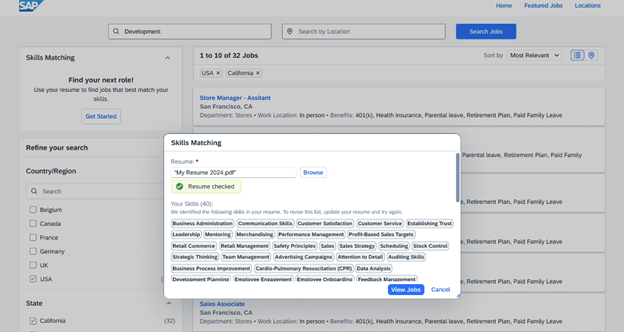Skills have become the cornerstone of many human resources practices—and one of the top HR trends in 2024. SAP’s HR researchers explored why both employees and organizations value a skills-based approach to people practices such as hiring.
According to findings from over five years of global research conducted by SAP SuccessFactors HR research scientists, 88% of employees would feel positively about skills-based people decisions in their organization. Along with employee satisfaction, HR and talent acquisition leaders see many potential benefits of the skills-based approach. For example, a focus on skills can support internal mobility, help realize employee potential, and make recruitment faster, easier, and more transparent.
So, what does “skills-based” mean? With a skills-based approach to human resource management, work is organized entirely around skills, from hiring and compensation to workforce planning, reskilling, and upskilling. Decisions are made based on skills and capabilities rather than traditional criteria like education or job experience.
Of course, there’s no universal blueprint that works for every scenario: there are multiple approaches to prioritizing skills in an organization. How skills-based practices are implemented depends on organizational culture, industry, labor regulations, and many other factors, but a great place to start is with skills-based hiring.
What Is Skills-Based Hiring?
Skills-based hiring is an approach to recruiting new employees based on their skills and ability to perform a job instead of the formal qualifications listed on their resume or curriculum vitae (CV), such as education or previous job titles.
Benefits of Skills-Based Hiring for Talent Acquisition
To understand why skills-based hiring works well for talent acquisition, we must consider the question what is talent acquisition? At its core, talent acquisition aims to address not just the current talent needs but also the long-term, strategic workforce plans. It can do so by predicting what skills the organization will require in the future to stay competitive, grow, and scale to future needs. Skills-based hiring can support a future-oriented talent acquisition strategy, thanks to:
- Productivity: People with the right skills for the job can be more effective in their roles.
- Diverse talent pools: A skills-based approach helps find qualified talent that wouldn’t be found otherwise, expands talent pools, and increases workforce diversity.
- Transparency: Skills-based talent decisions can be more equitable, fair, and legally defensible while also helping candidates get clarity and more agency over their careers.
- Efficiency: Skills-based practices enable faster talent decisions, which, in turn, accelerate the entire recruitment process, reducing time to hire and improving productivity.
- Strategic hiring: A skills-based approach helps organizations understand the skills they will need in the future and hire talent to fill those gaps.
- Approach validation: Skills-based hiring is a great way to demonstrate the value of prioritizing skills—before implementing the approach across other HR practices.
Considerations for Adopting Skills-Based Hiring: Exceptions, Misconceptions, and Challenges
Of course, there are still barriers to adopting the skills-based approach to hiring and recruitment. Sometimes, traditional criteria are necessary, such as when hiring for roles that require a specific degree or certification, like lawyers, doctors, and pilots. Candidates’ backgrounds and experience can also be crucial. Senior leaders may be chosen in part due to their industry or market experience; public relations leaders may be hired for their network and media contacts.
There are also many misconceptions about skills-based hiring. For instance, some believe that resumes are unsuitable for skills-based hiring because they’re structured around traditional criteria, such as education and past job titles. In reality, candidates can focus their CVs more on skills, and organizations can use applicant tracking systems and other recruitment software to analyze resumes and screen for the best applicants. In fact, thanks to the use of AI-enabled recruiting tools, skills can even be inferred from experience listed on resumes.
Finally, a widespread concern among talent acquisition leaders is how to make skills-based decisions equitably and efficiently. To do it fairly and thoroughly, they may need to research which skills are relevant for each role, devise custom skill assessments, and prepare job-specific interview questions rooted in the relevant skills. However, the recruitment process also needs to move along quickly, yield good results, and create a smooth candidate experience. So, although mindsets about skills-based hiring are changing, many talent acquisition leaders are still concerned about the efficiency of this approach. Thankfully, this is where technology can make a crucial difference.
Removing Barriers to Skills-Based Hiring
Skills-enabling technologies have long been used in HR practices: online learning systems to help employees develop new skills and complete required training, job architectures that help define roles and the skills needed for them, and skill assessments to help understand the capabilities and skill proficiencies that people have. While some potential barriers to adopting a fully skills-based approach may exist for certain roles, AI can help empower organizations to hire the best talent with the skills needed to succeed. Using SAP Business AI for HR and SAP SuccessFactors solutions can provide organizations with multiple approaches to adopting skills that may fit their unique workforce and hiring needs.
Using AI to Fuel Your Skills-Based Hiring Approach
The widespread adoption of AI in HR has opened up new capabilities in talent acquisition software while also optimizing existing functions. For example, with the SAP SuccessFactors Recruiting solution, talent acquisition teams can leverage AI to help them adopt skills-based hiring practices:
- Skills Framework: The SAP SuccessFactors talent intelligence hub offers an AI-enabled skills framework that can allow organizations to consolidate skills data from multiple sources for a comprehensive view of their workforce. AI-driven capabilities within the skills framework can allow organizations to align skills to job roles to better understand and address skills gaps.
- Job descriptions: AI-assisted content generation allows recruiters to quickly create and enhance compelling skills-based job descriptions to attract diverse candidates with the right skill sets.
- Improved candidate experience: When candidates upload their resumes during the application process, AI-driven skills extraction allows them to view, validate, and manage skills on their profiles.

- Job recommendations: Upcoming innovations include the ability for candidates to use AI to help them find the best opportunity for them based on skills extracted from their resume.
- Resume analysis: Using AI-driven skill inference, recruiters can quickly analyze applicants’ resumes and compare best-matched candidates based on skills.
- Interview questions: With insights from skills data, AI can recommend relevant skills-based interview questions to ensure interviewers are prepared to fully engage with top candidates.
- Skills evaluations: Using AI-recommended interview questions, interviewers can effectively assess candidates and provide evaluations based on the skills needed for a role.
- Equitable decision-making: AI-assisted applicant screening helps recruiters make bias-free, skills-based hiring decisions quickly and confidently.
AI can be a true catalyst to an organization’s hiring potential, and many of our customers are already leveraging AI-enabled capabilities. If you’re curious how works, check out this FC Bayern customer story.
Skills-based hiring is an excellent way to recruit the talent your organization needs to thrive and stay competitive—today and into the future. The right recruitment software can make skills-based hiring intuitive, equitable, and efficient.
For a deep dive into our skills research, get the full report on making skills a reality in your organization and explore SAP SuccessFactors Recruiting.



